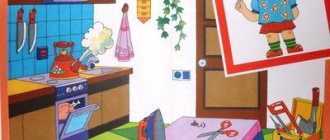Etiquette rules for children are one of the important topics that parents should raise in their family in a timely manner. A person of any age living in a society must take into account the norms of behavior accepted by this society and follow them. The child’s place in society depends on how conscientiously parents raise their child.
What is etiquette?
Etiquette is a set of norms and rules governing the behavior of people in society or a particular social group. When we talk about etiquette for children, we mean the rules of good behavior, first of all, in relation to adults, because they are the ones who can evaluate behavior as “good” or “bad” due to their experience.
Etiquette is divided into different types - there are both generally accepted rules and special etiquette for individual occasions (for example, official, religious, mourning). Children should be taught etiquette gradually, and for preschool age, those rules of good manners that children can apply in everyday situations are sufficient.
When to instill good manners?
You can teach children rules of behavior from a young age, although awareness will come much later - after 5 years. Children should be introduced to table manners from the age of 2. The child is already quite capable of eating on his own, which means it’s time to start explaining how he can and cannot behave while eating.
Preschoolers are taught etiquette by their parents at home and by teachers in kindergarten. The baby is in the company of adults and children; situations arise around him every day that require politeness, respect for elders, and the ability to interact with peers.
When a child grows up and goes to school, his level of freedom will increase, and there will be less control from adults. All omissions of parents in upbringing will be clearly visible, and correcting the behavior of schoolchildren is not easy. That is why the rules of etiquette and ethics (the foundations of ethics and ethics) must be laid down from an early age.
What should a preschooler know?
The best example for a child is family members, primarily parents. By imitating them, the baby learns good and bad, so parents must control their behavior in front of the child. You should not forcefully teach your child politeness if, due to his age, he still cannot understand why he needs to say hello to strangers. Or with those about whom his parents do not speak very well. In addition, imposing rules can lead to a backlash – protest.
Around age 5, just when adult imitation is in full swing, is the time to start paying your child's attention to how you interact with other people, especially outside the family. Here are the rules that a preschooler needs to know so as not to get into an awkward situation and not make their parents blush.
Speech etiquette
It is necessary to follow the rules of speech etiquette not only with members of your family, but in general with all children and adults, not necessarily only with acquaintances. Adults should set an example for children and also follow the rules of communication:
- greet your family in the morning, wish them good night before going to bed;
- greet acquaintances on the street and at a party, and then say goodbye to them;
- say hello to your neighbors, even if you don’t know each other personally;
- use the words “thank you”, “please”, “be kind”, “sorry”;
- address strangers using “you”;
- do not insult, do not tease other children, do not snitch, do not provoke;
- apologize if you did something wrong;
- say “let me interrupt you” if you need to address one of the speakers.
Table etiquette
A child should be taught table manners from an early age, and as they grow older, the requirements for the child will increase. The way a child behaves at the table creates the main idea of his upbringing, cleanliness and respect for such a family ritual as eating.
During meals, you must observe table etiquette:
- you need to eat only in a designated place (kitchen or dining room);
- use cutlery during family meals, this also applies to small children (prevent smearing food with your fingers on the plate);
- you need to eat from your own plate, do not comment on the contents of someone else’s;
- do not pounce on food if not all family members have gathered;
- do not chat with your mouth full, remember the rule “when I eat, I am deaf and dumb”;
- chew with your mouth closed;
- do not play with food, do not indulge in drinks (do not spill tea, water, do not drink juice loudly through a straw);
- it is indecent to express your negative opinion about food (“ugh, that’s disgusting”, “I won’t eat this”);
- it is indecent to put your elbows on the table, to push;
- It’s not nice to stretch across the entire table; you need to ask the person sitting next to you to pass something;
- You can’t pick your mouth at the table;
- you need to use a napkin or towel, and be able to ask for a clean napkin;
- take from the plate that piece of bread (piece of pie, sandwich, fruit) that is closest, and not choose the one that is larger or more beautiful;
- Moreover, it is indecent to take a piece from a common plate, hold it and put it back;
- before leaving the table, you need to wait until all family members have finished the meal, or ask adults for permission to leave;
- You can’t take a plate of food and go to the TV or to another room.
Guest etiquette
When visiting, you need to behave calmly, show respect to the owners of the house and follow the rules:
- do not come empty-handed (bring some kind of treat, even symbolic);
- do not ask for tea without an invitation;
- always say hello to the owners of the house;
- you cannot walk around rooms without permission and touch other people’s things on shelves or inside cabinets;
- It is strictly forbidden to jump on beds, sofas, chairs, even if the owner’s child does this;
- do not throw tantrums, do not demand anything from the owners of the apartment;
- keep clean, throw away trash after yourself (candy wrappers, juice boxes), collect toys after yourself;
- calmly pack up and leave when the time comes, do not demand to play more;
- Be sure to say “thank you” for the hospitality and food, and say goodbye to the owners of the house.
Family etiquette
The rules of behavior in each family are established individually, but there are common ones for all - respect and mutual understanding.
When communicating with family members, you must adhere to the following rules:
- older relatives must be treated with respect, without being rude, not insolent, or undermining the authority of the head of the family;
- You cannot swear or shout at family members;
- if you need to get into the room of your parents (or other relatives), you should definitely knock;
- it is at least ugly to tell or “report” on a brother or sister;
- It is important to respect the work of family members, be it cooking, cleaning the house or playing together.
Rules of behavior on the street
If at home only family members can judge a child’s upbringing, then on the street all the flaws in upbringing are striking. So that you don’t have to blush awkwardly and embarrassly take your baby away, teach him the following rules:
- there is a trash can for garbage;
- It is forbidden to walk on lawns or pick flowers from flower beds;
- it is indecent to point a finger at people and discuss their appearance out loud;
- you cannot cross the road whenever and wherever you want if cars are driving along it;
- You should not intrusively tell any personal information to strangers;
- it is forbidden to leave the place where the parent left the child waiting for him, or where they agreed to meet;
- When walking, you should not run far ahead of your parents or hide in busy places;
- when moving along the sidewalk, you need to walk on the right side (analogy with lanes for cars);
- Don’t stop in the middle of the sidewalk to tie a shoelace or chat with a friend—you need to step aside.
Behavior in transport
Sooner or later, you and your child will have to go somewhere by public transport, so instruct your little passenger in advance on how to behave on a bus, train, train, or plane:
- on the bus, give up your seat to older people (if the child is still small, then explain that now he needs to sit for his own safety, and another person will give up his seat to the grandmother);
- offer a place to pregnant women (when the child already knows this concept);
- on a long-distance train you cannot run around the carriage or knock on other people’s compartments;
- do not shout, do not knock on the wall of the train compartment;
- on an airplane you cannot stand up from your seat if this is temporarily prohibited, shout loudly, or push the seat in front with your feet;
- in any type of transport, it is indecent to dirty the person sitting in front with your feet or push the back of the chair with dirty shoes;
- It is forbidden to shout, laugh loudly, or sing songs.
Rules of conduct at the theater, circus or other cultural event
Parents have the opportunity to introduce children to cultural life from an early age - theaters, museums and other institutions are now available almost from birth. Therefore, before visiting such places, you need to explain to your child how to behave:
- do not be late for the performance, but arrive with plenty of time to return your outerwear and visit the restroom, if necessary;
- come to the hall before the program starts in order to take your seat and not disturb your neighbors;
- if you are still late, you need to move forward to your seat along the row facing forward, and apologize for the inconvenience caused;
- do not crunch on food or make noise with your drink during a performance or movie show;
- do not talk during the session, do not answer phone calls, put the device on silent mode.
General rules of conduct
There are things that are unacceptable in any place, in any team:
- scratching, picking teeth, ears, nose in public;
- get ahead of others when passing through a door, for example, in a store;
- scream, run, slam doors;
- be rude, answer questions unkindly;
- cough without covering your mouth and burp without apologizing;
- shouting on public transport;
- run and step on feet;
- shuffle your feet when walking;
- chew gum without covering your mouth, chew loudly in public.
My phone rang
When the baby gets a little older, he can make and answer phone calls himself.
Teach him how to talk on the phone:
- Tell your child that phone conversations should be brief and polite.
- It is considered indecent to call before 08:00 and after 21:00.
- After dialing the number, the conversation begins with a greeting.
- It would be a good idea to ask if this call is distracting the person.
- If you receive a call asking to invite one of your family members to the phone, there is no need to ask unceremonious questions like “Why do you need him?” The person will introduce himself and say why he is calling if he decides that it is necessary.
- If they call mom (dad, grandmother), but she is not at home, it is appropriate to ask who called and what to say.
- Don't forget to respond to greetings.
- If a child makes a call and hears an unfamiliar voice on the phone, then you need to introduce yourself and ask to call the person you need.
- If your child dials the number incorrectly, you need to apologize and hang up. If they call you at home with the wrong number, you don’t need to get angry, but politely explain: “You’re wrong.”
- If a stranger calls, then you should not post details about the life of the family; it is better to call one of the adults. If the child is alone at home, there is no need to notify anyone about this by phone.
Rules of conduct for preschoolers in pictures
You can teach your child etiquette both by example and by visual aids. You can explain how to behave in society and show illustrations. The book “Etiquette for Kids” in pictures by E. V. Sokolova and N. N. Yankovskaya is suitable for this.
When showing your child a picture, you can ask leading questions: “What do you think is shown here? How should you behave?" Let the child try to formulate the rules of behavior himself.
Learning by playing
You can also teach your child the rules of good manners through play. Conduct politeness lessons at home when you are studying with him or just playing in the nursery. You can play out situations with the help of dolls and your favorite toys - write a fairy tale about someone ill-mannered, act out a mini-scene, come up with etiquette games (“tea party with dolls”, “the bear went to visit”, etc.), and then - discuss and ask: “Who did the right thing? And why? Who will mom praise?" You can put on a whole theatrical performance for kids.
Read books on this topic and discuss which characters behave correctly and which ones are rude to others. There are many books on the topic of children's etiquette, here are some of them:
- “Etiquette for children of different ages”, A. Usachev;
- “Rules of Conduct”, E. Beaumont;
- “Polite words”, O. Korneeva;
- “Sociable Tales”, T. Shorygina;
- “The ABC of Politeness”, L. Vasilyeva-Gangnus;
- “School of politeness for small owners”, N. Ivanova, G. Shalaeva;
- “Rules of conduct for well-mannered children”, G. Shalaeva, O. Zhuravleva, O. Sazonova;
- “The most important rules of behavior for well-mannered children”, Harvest publishing house;
- “Etiquette for Fidgets”, Clever publishing house;
- “How to behave at the table. Etiquette for everyone in stories, poems, pictures,” ed. R. Dankova.
In preschool educational institutions, children are taught politeness according to specially developed programs. Teachers organize classes and teach children the rules of good manners, but this does not mean that parents should abandon this topic and rely only on teachers.
Where should I start?
Where do the rules of good behavior and etiquette for children begin? At the initial stages, a child should be taught discipline by gradually introducing a daily routine into his life. He must go to bed and wake up on time, and also learn simple sequences of actions: washing, brushing teeth, dressing, etc. And in the future - do homework, rest at the strictly allotted time. All this will help the child feel confident and secure; he will acquire the skills to organize his activities as rationally and efficiently as possible. And also focus your attention on what is important at a given moment in time.
Every child should follow a daily routine
A significant advantage of the daily routine for children is also the most accurate “tuning” of the child’s biological clock. Which, in turn, allows him to adjust his sleep and rest patterns, protecting the nervous system from overload.
In the early stages, children's guidance should be the parent's direction. A younger student can be asked to work together to develop a daily routine that he will adhere to. In middle school, parental control comes down to simple tips that guide the child’s activities. The next step will be for the child to acquire the skill of organizing their day independently.
Table etiquette training
By learning to clean his room and put his toys in their place, a child not only helps his parents keep the room tidy, but also develops skills that will be valuable to him in the future. This is, first of all, the ability to organize activities, systematize, the ability to filter information and separate the essential from the insignificant.
Note to parents
It is difficult to name the exact age when you need to start teaching your child good manners. It is necessary to instill in a child norms of behavior with family members and society from birth, even when the child does not understand the whole essence. He understands the intonations, the mood of his family and sees the picture of what is happening.
The table below clearly illustrates the approximate age range when you can introduce your child to the rules of behavior.
Table “When and how to teach a child etiquette”
| Age | What to pay attention to |
| Up to 1 year | We use polite words in our speech (“thank you”, “please”, “good morning”, “good night”) |
| We wash our hands before eating, saying out loud why we need to do this | |
| 1-3 years | We instill neatness - use a bib or napkin, change soiled clothes after eating, wash your face and hands |
| We instill norms of behavior and communication in the family, showing by example respect and politeness | |
| We teach to eat with a spoon and fork, we replace the sippy cup with a mug | |
| 3-5 years | We improve the skill of using cutlery, teach how to eat carefully - do not move away from the table, lean towards the plate so as not to spill the soup, and not to spread “dirt” around you |
| We actively teach independent personal hygiene - brushing teeth, washing hands, using a handkerchief or napkin. | |
| We teach you to cover your mouth when coughing or sneezing; don’t forget about polite wishes addressed to another person (“Be healthy”) | |
| We introduce the child to the rules of behavior in public places, transport, at a party, at cultural events, in kindergarten | |
| 5-6 years | We continue to introduce the child to table etiquette, adding the use of a knife to everyday life |
| We improve our knowledge of guest etiquette, apply the rules if we go on a visit; we correct mistakes, explain to the child why some actions are unacceptable | |
| By our example we constantly show how to communicate in the family and in society outside it, we monitor our behavior | |
| School age | Let’s not forget everything we instilled in the child before; we remind you how to behave at the table (in the school canteen), in lessons (speech etiquette, respect for the teacher, peers), in transport (independent trips) and public places |
A culture of speech
Children of this age have a hard time learning complex words, but this is not a reason to give them up. From an early age, kids need to be told “magic” words that will be useful to them in the future. Namely:
- Thank you;
- Please;
- Hello hi);
- goodbye (bye);
- Bon appetit;
- Good night;
- Good morning.
At the same age, it is worth teaching a child not to be offended over trifles, not to complain about others. How prepared he will be for a larger group (school) depends on this. Etiquette lessons for children 2-3 years old can be conducted in a playful way to make it more interesting and easier for children to perceive new information. For example, use your favorite toys to play out this or that situation (the bunny said “thank you” to the bear for the candy).








